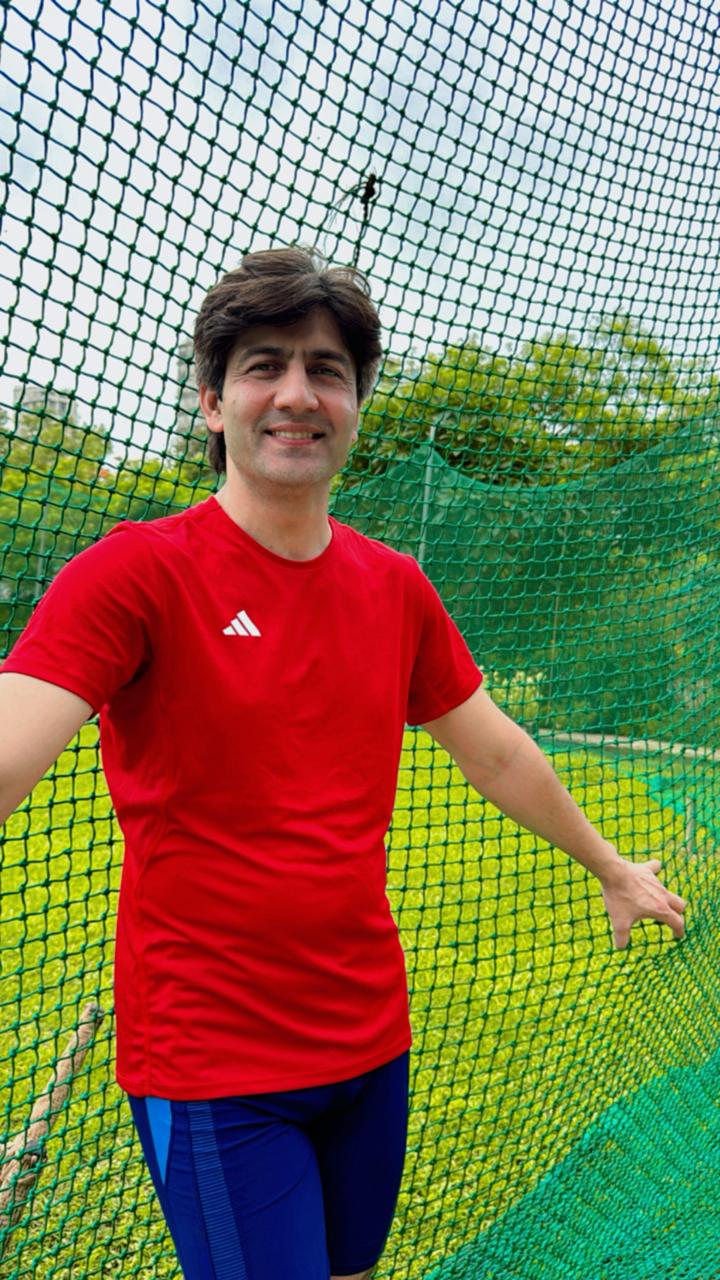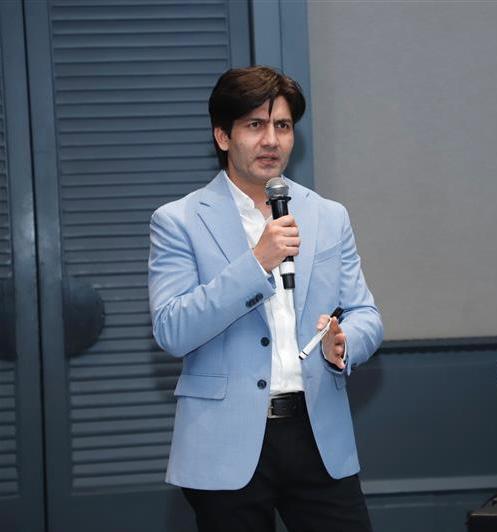Parvez Siraj, a reputed name in corporate echelons, has more than 18 years of experience with a focus on strategy, business transformation, project management, team building, and change management.
Presently serving as a Vice President to Lupin Ltd., Parvez Siraj has worked extensively across UK, Romania, Middle East, USA, South Africa, and Japan. An MBA from IMT Ghaziabad and a BE from the highly prestigious NIT Silchar, Parvez Siraj has multi-industry experience in solving business problems and under diverse cultural and global environments. Parvez Siraj is working on a mission to impact 1 Million lives through storytelling, workshops, and personal coaching programs, and has been invited by premier institutions like IITs, IIMs, Nirma University, Thapar Institute, along with others, as a Speaker and Panelist.
In an Exclusive Interview with Nitish Raj; Editor-in-Chief, Today Magazine, the reputed business leader talks about his journey, belief system, and corporate career.
Q.1 Having a Bachelor's in Engineering from the highly prestigious NIT Silchar and an MBA from IMT Ghaziabad, you have a very distinguished career across various sectors. How do you see your career and how it has transformed you as an individual?
PS:
When I look back, I see I have transformed as an individual both professionally and personally.
Q.2 You kick-started your career with Motherson Sumi Systems Limited, which is an auto component manufacturer, and are now serving as the Vice President of Lupin Limited. What mental aspects does a person have to develop or change while serving in a completely different sector, as you have been an engineering graduate, while Lupin Limited is a top-notch pharma company?
PS: You mentioned my first and current employer, but in between, I have worked with amazing companies like Wipro, Samsung, Tech Mahindra, Target, and PwC.
Having been exposed to multiple industries has helped me in numerous ways. I got to understand the operating model, supply chain, product life cycle, challenges, and good or best practices. It broadened my perspectives, and I started looking at any problem through multiple lenses.
It enhanced my problem-solving skills, and most importantly, it gave me the confidence that put me in any frame, I will fit into it.
Q.3 What lessons have you learnt through your journey?
PS: There are numerous learnings, and it’s difficult to pick from them because each one has its own importance and context. Let me name a few:
Lesson 1: Nothing is impossible. We are limited by our own thoughts. Think of a riddle that looks impossible till we don’t know the answer. Once we know the answer, it looks so simple. The same principle applies in life, also. Another example is lock and key. We can’t open the lock till there is the right key. Once we have the right key, it opens the lock so easily. So, we shall find the key.
Lesson 2: Your strength can become your weakness, and weakness can become your strength. During my initial career path, speed was my biggest strength. Since I was very fast in completing my tasks, I used to get huge appreciations. When I moved up in the ladder, I used to finish my work faster than others. It gave others the impression that I was not taking them along, and slowly they started isolating me. So what once was my strength became my weakness later.
Lesson 3: In life, choose what is good for you and drop what will pull you back. It applies to your thoughts, actions, and social circle. If we go through any bad experience, we shall not crib about the poor experience; instead, take the learning and move forward. We pick flowers from the garden and leave the thorns.
Q.4: Interestingly, you talked about how nothing is impossible. Why do you say so? I have heard there is a story behind. May I request that you share?
PS: Yes, there is a story behind Everything is possible statement.
I have a daughter, and she is 8 years old. A couple of years back, she went to her friend’s birthday party. When she returned, she was very upset. I asked her, but she did not tell me anything. When I insisted, then she opened. She said there was a masquerade at the party, and he was performing many activities. He was spinning a basketball on his finger. She said she asked him if she could try the trick, and he said it’s impossible for you to spin. And when she tried, it was impossible.
I told her, Ayesha, he has been doing it for many years, so it’s easy for him to do. If you are not able to perform that trick, it doesn’t mean it is impossible; it may be difficult. I didn’t want this word to be impossible to enter her brain. She is too young to absorb such negative words. Anyway, I told her a couple of times that nothing is impossible. Then she suddenly said something that astonished me. She said, If it is not impossible, can you spin the basketball on your finger.
I was stunned to hear because I had never touched a basketball ever. Something interesting happened, I told her, give me some time and I will show you. It took me almost four months to learn this skill. When I showed her, she could not believe and then ‘everything is possible’ became a mantra for her.
This instance changed her life. She started doing a lot of things she had never tried before. This not only changed her life but also changed my life too. My perspective on life changed.
Q.5 Is this the inspiration for your book? Tell me a little bit about your book, and if it's fine for you?
PS: Yes, this incident was like a eureka moment. I revisited my life, put different jigsaw pieces in order, and a beautiful picture emerged.
Before I talk about my book, let me ask you one question?
Do you think we perform up to our capabilities?
NR: I think no
PS: Any idea up to what level we perform?
NR: Around 50%
PS: One more try?
NR: 60%
PS: You will be surprised to know that, on average, we perform 10% of our capabilities. We are all always underperforming.
NR: It means we have huge potential to improve.
PS: Exactly. But I was able to solve this complex equation. I could unearth what are the elements that can unlock the potential.
Q.6. Interesting. Please tell me more about it. What are those factors?
PS: If we work on the following three factors, it can change are lives.
- 1. Belief system
- 2. Communication
- 3. Mindset
Q.7. People talk a lot about a belief system. Please elaborate on the belief system and how it can help us in our growth.
PS: Belief plays a very big role in our growth. It can push us to new heights or pull us back.
Let me give you an example.
Have you visited a zoo?
NR: Yes
PS: Which is the tallest animal?
NR: Giraffe
PS: Which is the strongest animal?
NR: Elephant
PS: Which is the fastest animal?
NR: Cheetah
PS: Now tell me who is the king of the jungle?
NR: Lion
Exactly! Lion is neither the fastest, the tallest, nor the strongest, still he is the king, because he believes he is the king. He doesn’t need any validation. Similarly, if we have a belief, we can achieve.
If we believe we can’t, then we can never win.
Q.7. Was there a moment when you were at your lowest, felt that everything had finished, but you bounced back?
PS: We all have ups and downs in our lives. I always feel they are blessings in disguise. There is a saying, What doesn’t kill you makes you stronger.
I would like to share my personal story that jolted me initially, but it made me stronger, and my better version bloomed once I was out of it.
The first incident happened in 2019; I was diagnosed with a serious disease. When my family members and friends got to know about it, I felt sad. My family members, especially my mother, wife, and sisters, were emotionally broken; they were in tears and said, “Parvez, why you?”. Looking at everything around me made me feel very scared. I started thinking, will I recover or not, and the same question always haunted me too, ‘why me’.
Then suddenly there was a reckoning. My entire life flashed in front of me like a movie. I started counting my achievements and blessings:
I was the blue-eyed boy for all my teachers and my friends during my school days. I completed my engineering from NIT Silchar in the very first attempt. Then I went on to complete an MBA from IMT Ghaziabad. I pursued my career in dream companies like Wipro, Samsung, and TechM. I was passionate about the management consulting profile, which I was offered at PwC.
I have a caring family, wonderful friends. When all these things happened, I never said, ‘Why me!’.
I was filled with gratitude. It relieved me completely. Maybe with this life-turning thought, I recovered and came out of that difficult time.
Q.8 You are writing a book? What inspired you, and what is this book about?
PS: As I have previously mentioned about my daughter and the incident about her attending a birthday party and returning home with the puzzled thought about the spinning basketball skill. That incident and the output made me realize that we always undermine our potential, so the idea for the book generated from there.
Q.9 What would be your suggestion to the youngsters who wish to rise the ladder of corporate success?
PS: The youngsters of today are super smart, and they may not need my suggestions; however, I would like to share a few learnings I got during my corporate journey of 18+ years.
1. We shall walk in the direction of our fears.
2. Keep sharpening our skills around where we were, where we are, and where we will be, and how relevant our skills will be for ages to come, and which no technology could replace: Effective Communication, Problem-solving, and Storytelling.
3. Don’t be happy with small goals. Why make resolutions when we can bring revolution? What you can conceive and perceive, you can achieve.






